| Listing 1 - 10 of 10 |
Sort by
|
Book
ISBN: 9780822359104 9780822359258 9780822375401 Year: 2015 Publisher: Durham Duke University Press
Abstract | Keywords | Export | Availability | Bookmark
 Loading...
Loading...Choose an application
- Reference Manager
- EndNote
- RefWorks (Direct export to RefWorks)
In Intimate Empire Nayoung Aimee Kwon examines intimate cultural encounters between Korea and Japan during the colonial era and their postcolonial disavowal. After the Japanese empire's collapse in 1945, new nation-centered histories in Korea and Japan actively erased these once ubiquitous cultural interactions that neither side wanted to remember. Kwon reconsiders these imperial encounters and their contested legacies through the rise and fall of Japanese-language literature and other cultural exchanges between Korean and Japanese writers and artists in the Japanese empire. The contrast between the prominence of these and other forums of colonial-era cultural collaboration between the colonizers and the colonized, and their denial in divided national narrations during the postcolonial aftermath, offers insights into the paradoxical nature of colonial collaboration, which Kwon characterizes as embodying desire and intimacy with violence and coercion. Through the case study of the formation and repression of imperial subjects between Korea and Japan, Kwon considers the imbrications of colonialism and modernity and the entwined legacies of colonial and Cold War histories in the Asia-Pacific more broadly.
Japanese literature--Korean authors--History and criticism --- Korea--History--Japanese occupation, 1910-1945 --- National characteristics, Korean --- Japanese literature --- Imperialism in literature --- Modernism (Literature) --- Postcolonialism in literature --- Language and languages in literature --- Korean authors --- History and criticism
Book
ISBN: 9788917214338 8917214339 Year: 2012 Publisher: Seoul YBM
Abstract | Keywords | Export | Availability | Bookmark
 Loading...
Loading...Choose an application
- Reference Manager
- EndNote
- RefWorks (Direct export to RefWorks)
Ch'oe, Nam-sŏn, --- Korea --- History --- K9160 --- K9300.60 --- K9125.60 --- Korea: History -- modern period (1860s-[1945]), 20th century general --- Korea: Social sciences -- social and cultural history -- modern period (1860s-[1945]), 20th century general --- Korea: Genealogy and biography -- biography -- modern period (1860s-[1945]), 20th century general --- Ch'oe, Nam-sŏn, - 1890-1957 --- Korea - History - Japanese occupation, 1910-1945 - Biography.
Book
ISBN: 9781501751882 1501751883 1501751891 1501751905 9781501751905 9781501751899 Year: 2020 Publisher: Ithaca
Abstract | Keywords | Export | Availability | Bookmark
 Loading...
Loading...Choose an application
- Reference Manager
- EndNote
- RefWorks (Direct export to RefWorks)
'Imperial Romance' argues that the idea of colonial intimacy within the Japanese empire of the early twentieth century had a far broader and more popular influence on discourse makers, social leaders, and intellectuals than previously understood. The book investigates representations of Korean-Japanese intimate and familial relationships - including romance, marriage, and kinship - in literature, media, and cinema, alongside documents that discuss colonial policies during the Japanese protectorate period and colonial rule in Korea (1905-45). Focusing on Korean perspectives, the book uncovers political meaning in the representation of intimacy and emotion between Koreans and Japanese portrayed in print media and films.
Interethnic marriage --- Intermarriage in literature --- Japanese --- K9300.70 --- K9700.70 --- K9741.70 --- Ethnology --- Ethnic intermarriage --- Intermarriage --- Social aspects --- History --- Korea: Social sciences -- social and cultural history -- Japanese annexation period (1905-1945) --- Korea: Literature -- history -- Japanese annexation period (1905-1945) --- Korea: Performing and media arts -- history -- Japanese annexation period (1905-1945) --- Korea --- Japan --- Colonial influence --- Intermarriage in literature. --- Japanese occupation, 1910-1945.
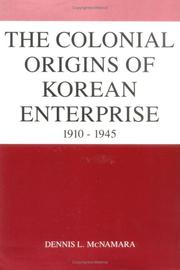
ISBN: 0521385652 0521032083 0511528108 Year: 1990 Publisher: Cambridge Cambridge University Press
Abstract | Keywords | Export | Availability | Bookmark
 Loading...
Loading...Choose an application
- Reference Manager
- EndNote
- RefWorks (Direct export to RefWorks)
South Korean conglomerates, or 'chaebol,' such as Hyundai and Samsung, play a far more important role in the Korean economy than do comparable large firms in the US and Japanese economies. Despite the importance of the chaebol to the rapid postwar development of the Korean economy, little has been written about their origins during the Japanese occupation. Through case studies of local ownership in major financial, commercial, and industrial ventures, this book provides a detailed picture of indigenous capitalism during Japanese colonization. Drawing on Japanese government sources, Korean biographies and diaries, interviews and US intelligence material, the author gives a compelling account of key personalities in the Korean business elite and of the personal dilemmas of balancing nationalism against success under dependent, colonial conditions. The author concludes that dependent rather than comprador capitalism characterized leading Korean businesses through 1945. Patterns of concentration within family enterprises, close ties with the colonial state, and mutual support among a Korean inner circle of business leaders constitute a legacy of the colonial period important to the subsequent development of Korean conglomerates.
History of Asia --- anno 1900-1999 --- South Korea --- Corporations --- -K9400.70 --- K9410 --- K9170 --- Business corporations --- C corporations --- Corporations, Business --- Corporations, Public --- Limited companies --- Publicly held corporations --- Publicly traded corporations --- Public limited companies --- Stock corporations --- Subchapter C corporations --- Business enterprises --- Corporate power --- Disincorporation --- Stocks --- Trusts, Industrial --- History --- -Korea: Economy and industry -- history -- Japanese annexation period (1905-1945) --- Korea: Economy and industry -- organization and systems --- Korea: History -- Japanese annexation period (1905-1945) --- Korea --- Economic conditions --- -History --- -Corporations --- -History of Asia --- K9400.70 --- Korea: Economy and industry -- history -- Japanese annexation period (1905-1945) --- Japan --- Korea [South ] --- 20th century --- 1910-1945 --- Japanese occupation, 1910-1945 --- Corporations - Korea (South) - History - 20th century. --- Korea - Economic conditions - 1910-1945. --- Korea - History - Japanese occupation, 1910-1945. --- Social Sciences --- Political Science
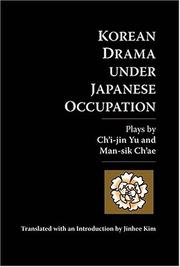
ISBN: 193190717X 9781931907170 Year: 2004 Publisher: Paramus Homa & Sekey
Abstract | Keywords | Export | Availability | Bookmark
 Loading...
Loading...Choose an application
- Reference Manager
- EndNote
- RefWorks (Direct export to RefWorks)
Korean drama --- Yu, Chi-jin, --- Chae, Man-sik, --- Korea --- History --- K9749 --- K9741.70 --- K9170 --- Korea: Performing and media arts -- theater, drama -- plays, scripts and scenarios --- Korea: Performing and media arts -- history -- Japanese annexation period (1905-1945) --- Korea: History -- Japanese annexation period (1905-1945) --- Korean literature --- Chʻae, Man-sik, --- Yu, Chʻi-jin, --- Ch'ae, Paengnŭng, --- Ch'ae, Paeng-nŭng, --- Chae, Man-shik, --- 蔡 萬植, --- 채 만식, --- Korean drama - 20th century - Translations into English --- Yu, Chi-jin, - 1905- - Translations into English --- Chae, Man-sik, - 1902-1950 - Translations into English --- Korea - History - Japanese occupation, 1910-1945 - Drama --- Yu, Chi-jin, - 1905 --- -Chae, Man-sik, - 1902-1950
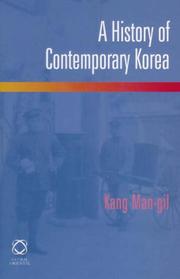
ISBN: 1905246056 9786611906467 1281906468 9781905246052 Year: 2006 Publisher: Folkstone, Kent, UK : Global Oriental,
Abstract | Keywords | Export | Availability | Bookmark
 Loading...
Loading...Choose an application
- Reference Manager
- EndNote
- RefWorks (Direct export to RefWorks)
K9160 --- K9180 --- Korea: History -- modern period (1860s-[1945]), 20th century general --- Korea: History -- post World War II (1945- ) --- Korean reunification question (1945- ) --- Mouvements de libération nationale --- Corée, Question de la réunification de la (1945- ) --- Corée du Sud --- Mouvements de libération nationale --- Corée, Question de la réunification de la (1945- ) --- Corée du Sud --- Korea (South) --- Korea --- Japan --- History. --- History --- National liberation movements --- Economic conditions --- Corée --- Economic conditions. --- Histoire --- Conditions économiques --- National liberation movements - Korea --- Korea - History - Japanese occupation, 1910-1945 --- Korea - History - Allied occupation, 1945-1948 --- Korea (South) - History --- Korea - History - 1945 --- -Korea - Economic conditions
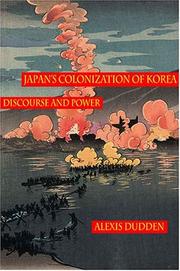
ISBN: 0824828291 9780824828295 0824863143 1435665511 Year: 2005 Publisher: Honolulu University of Hawaii press
Abstract | Keywords | Export | Availability | Bookmark
 Loading...
Loading...Choose an application
- Reference Manager
- EndNote
- RefWorks (Direct export to RefWorks)
Law --- History --- Korea --- Japan --- Foreign relations --- International status --- History. --- International status. --- K9170 --- K9171 --- J3374.90 --- Korea: History -- Japanese annexation period (1905-1945) --- Korea: History -- Japanese annexation period -- annexation (1905-1910) --- Japan: History -- Kindai, modern -- Meiji period -- annexation of Korea (1905-1945) --- Acts, Legislative --- Enactments, Legislative --- Laws (Statutes) --- Legislative acts --- Legislative enactments --- Jurisprudence --- Legislation --- Law - Japan - History --- Law - Korea - History --- Korea - History - Japanese occupation, 1910-1945 --- Japan - Foreign relations - Korea --- Korea - Foreign relations - Japan --- Japan - Foreign relations - 1868-1912 --- Korea - Foreign relations - 1864-1910 --- Korea - International status
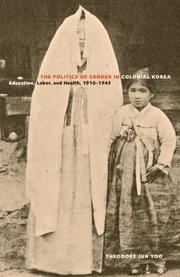
ISBN: 1282359339 9786612359330 0520934156 9780520934153 0520252888 9780520252882 9781282359338 Year: 2008 Publisher: Berkeley University of California Press
Abstract | Keywords | Export | Availability | Bookmark
 Loading...
Loading...Choose an application
- Reference Manager
- EndNote
- RefWorks (Direct export to RefWorks)
This study examines how the concept of "Korean woman" underwent a radical transformation in Korea's public discourse during the years of Japanese colonialism. Theodore Jun Yoo shows that as women moved out of traditional spheres to occupy new positions outside the home, they encountered the pervasive control of the colonial state, which sought to impose modernity on them. While some Korean women conformed to the dictates of colonial hegemony, others took deliberate pains to distinguish between what was "modern" (e.g., Western outfits) and thus legitimate, and what was "Japanese," and thus illegitimate. Yoo argues that what made the experience of these women unique was the dual confrontation with modernity itself and with Japan as a colonial power.
Sex role --- Women --- Gender role --- Sex (Psychology) --- Sex differences (Psychology) --- Social role --- Gender expression --- Sexism --- Human females --- Wimmin --- Woman --- Womon --- Womyn --- Females --- Human beings --- Femininity --- History --- Social conditions --- Korea --- Japan --- Women - Korea - Social conditions - 20th century --- Sex role - Korea - History - 20th century --- Korea - History - Japanese occupation, 1910-1945 --- Gender roles --- Gendered role --- Gendered roles --- Role, Gender --- Role, Gendered --- Role, Sex --- Roles, Gender --- Roles, Gendered --- Roles, Sex --- Sex roles --- colonial hegemony. --- colonial power. --- comfort women. --- family. --- feminists in asia. --- gender women studies. --- generational. --- japan korean relations. --- japanese colonialism. --- korean feminist. --- korean history. --- korean women. --- life changes. --- life lessons. --- modernity. --- pervasive control. --- political roles. --- public discourse. --- radical transformation.

ISBN: 9780520252882 0520252888 Year: 2008 Volume: 3 Publisher: Berkeley University of California
Abstract | Keywords | Export | Availability | Bookmark
 Loading...
Loading...Choose an application
- Reference Manager
- EndNote
- RefWorks (Direct export to RefWorks)
Women --- Sex role --- Social conditions --- History --- Korea --- -Sex role --- -K9327 --- K9170 --- K9300.70 --- K9340 --- J3374.90 --- Gender role --- Sex (Psychology) --- Sex differences (Psychology) --- Social role --- Gender expression --- Sexism --- Human females --- Wimmin --- Woman --- Womon --- Womyn --- Females --- Human beings --- Femininity --- -20th century --- Korea: Communities, social classes and groups -- gender roles, women, feminism, men --- Korea: History -- Japanese annexation period (1905-1945) --- Korea: Social sciences -- social and cultural history -- Japanese annexation period (1905-1945) --- Korea: Social policy and pathology --- Japan: History -- Kindai, modern -- Meiji period -- annexation of Korea (1905-1945) --- -Women --- K9327 --- Japan --- Gender roles --- Gendered role --- Gendered roles --- Role, Gender --- Role, Gendered --- Role, Sex --- Roles, Gender --- Roles, Gendered --- Roles, Sex --- Sex roles --- Women - Korea - Social conditions - 20th century --- Sex role - Korea - History - 20th century --- Korea - History - Japanese occupation, 1910-1945
Book
ISBN: 0520293150 0520958411 9780520958418 9781306320849 1306320844 9780520276550 0520276558 9780520293151 Year: 2014 Volume: 12 Publisher: Berkeley
Abstract | Keywords | Export | Availability | Bookmark
 Loading...
Loading...Choose an application
- Reference Manager
- EndNote
- RefWorks (Direct export to RefWorks)
Assimilating Seoul, the first book-length study written in English about Seoul during the colonial period, challenges conventional nationalist paradigms by revealing the intersection of Korean and Japanese history in this important capital. Through microhistories of Shinto festivals, industrial expositions, and sanitation campaigns, Todd A. Henry offers a transnational account that treats the city's public spaces as "contact zones," showing how residents negotiated pressures to become loyal, industrious, and hygienic subjects of the Japanese empire. Unlike previous, top-down analyses, this ethnographic history investigates modalities of Japanese rule as experienced from below. Although the colonial state set ambitious goals for the integration of Koreans, Japanese settler elites and lower-class expatriates shaped the speed and direction of assimilation by bending government initiatives to their own interests and identities. Meanwhile, Korean men and women of different classes and generations rearticulated the terms and degree of their incorporation into a multiethnic polity. Assimilating Seoul captures these fascinating responses to an empire that used the lure of empowerment to disguise the reality of alienation.
HISTORY / Asia / General. --- Japanese --- Koreans --- Public spaces --- Public places --- Social areas --- Urban public spaces --- Urban spaces --- Cities and towns --- Ethnology --- History --- Cultural assimilation --- Social aspects --- Korea --- Seoul (Korea) --- Japan --- Seoul Metropolitan Government (Korea) --- Sye-ul (Korea) --- Wang-ching (Korea) --- Wō-jō (Korea) --- Kyŏngsŏng (Korea) --- Keijō (Korea) --- Choei-yuen (Korea) --- Hang-yang-tcheng (Korea) --- Han-yang (Korea) --- Hâ-seng (Korea) --- Kan-yō-jō (Korea) --- Keizyō (Korea) --- Kiung (Korea) --- Seul (Korea) --- Sŏul (Korea) --- Sŏul T'ŭkpyŏlsi (Korea) --- Sīʼūl (Korea) --- Seoul Special City (Korea) --- 서울 (Korea) --- Seoul-teukbyeolsi (Korea) --- 서울특별시 (Korea) --- Keijō-fu (Korea) --- Keijō-shi (Korea) --- Kēzyō (Korea) --- Kyŏngsŏng-bu (Korea) --- Special City of Seoul (Korea) --- Seoul City (Korea) --- Sŏul-si (Korea) --- Ethnic relations --- J3374.90 --- K9170 --- K9211 --- K9300.70 --- Japan: History -- Kindai, modern -- Meiji period -- annexation of Korea (1905-1945) --- Korea: History -- Japanese annexation period (1905-1945) --- Korea: Geography and local history -- Kyŏnggi-do -- Seoul, Kyŏngsŏng --- Korea: Social sciences -- social and cultural history -- Japanese annexation period (1905-1945) --- Public spaces -- Social aspects -- Korea (South) -- Seoul -- History -- 20th century.. --- Koreans -- Cultural assimilation -- Korea (South) -- Seoul -- History -- 20th century.. --- Seoul (Korea) -- History -- 20th century.. --- Seoul (Korea) -- Ethnic relations -- History -- 20th century.. --- Korea -- History -- Japanese occupation, 1910-1945. --- alienation. --- asian history. --- assimilation. --- city spaces. --- civic assimilation. --- class and nation. --- colonial capital. --- colonial period. --- colonial state. --- colonialism. --- contact zones. --- conventional nationalist paradigms. --- empire. --- ethnographic history. --- government initiatives. --- historical. --- imperialism. --- industrial. --- japanese history. --- japanese imperialism. --- japanese rule. --- korea. --- korean history. --- material assimilation. --- multiethnic polity. --- postcolonial. --- public spaces. --- sanitation. --- seoul. --- shinto festivals. --- spiritual assimilation. --- transnational.
| Listing 1 - 10 of 10 |
Sort by
|

 Search
Search Feedback
Feedback About UniCat
About UniCat  Help
Help News
News